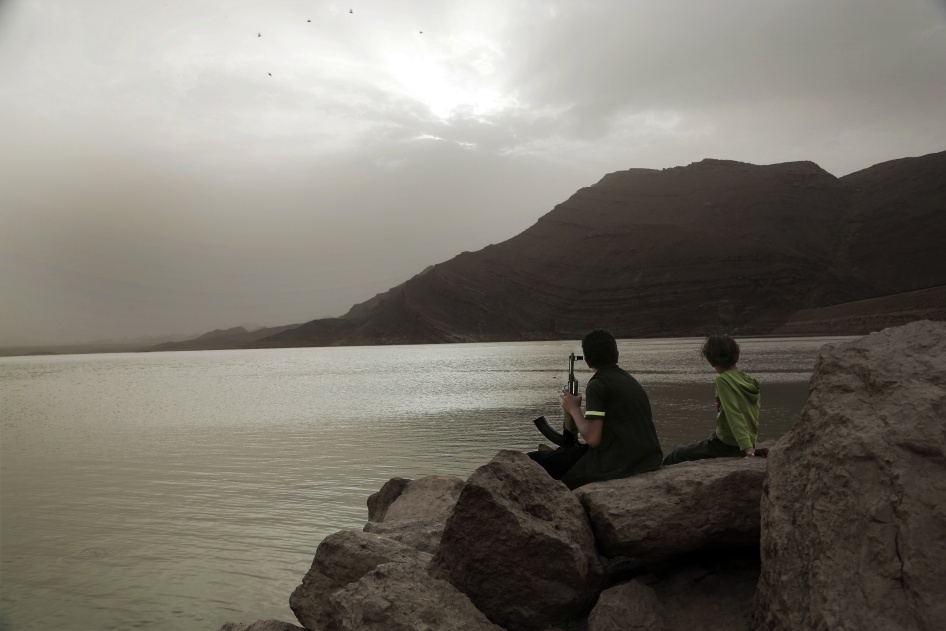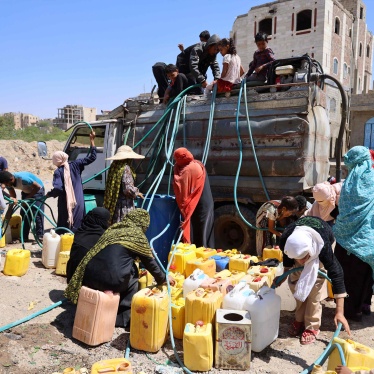(Beirut) – The Houthis say they have recruited thousands of people to their armed forces since October 7, 2023, and activists report the armed group recruiting children as young as 13, Human Rights Watch said today. Recruiting children younger than 15 is a war crime.
On October 10, Abdul Malik al-Houthi, the leader of the Houthi movement, also known as Ansar Allah, made a speech in which he called for people to be ready to defend Palestine, in response to the atrocities carried out during the hostilities between Israeli forces and Palestinian armed groups in Gaza since October 7. Though the Houthis have systematically recruited children in Yemen since at least 2009, child recruitment by the Houthis has increased noticeably in the last few months amid the hostilities in Gaza, activists said.
“The Houthis are exploiting the Palestinian cause to recruit more children for their domestic fight in Yemen,” said Niku Jafarnia, Yemen and Bahrain researcher at Human Rights Watch. “The Houthis should be investing resources into providing the basic needs of children in their territories like good education, food, and water, rather than replacing their childhood with conflict.”
Human Rights Watch spoke with five human rights activists and individuals working with civil society organizations across Yemen, who confirmed a significant increase in child recruitment in recent months.
One woman who leads a human rights-focused nongovernmental organization said: “The Houthis make children believe that they will fight to liberate Palestine, but they end up sending them to [the front lines in] Marib and Taizz. Indeed, the Houthis’ Gaza is Marib [a Yemeni city with oil resources Houthis have repeatedly attacked].” The Houthis have also unlawfully besieged the northeastern city of Taizz since 2015, in which they have blocked water and humanitarian aid from reaching civilians.
On November 16, during a graduation ceremony for the first group of military recruits since October 7, the Houthis announced that they would form new military brigades to carry out al-Houthi's October 10 directive.
A member of the Houthis’ political office, Houtham Assad, told various media outlets: “As for the general mobilization in support of our people in the Gaza Strip ... training camps were opened, tens of thousands of young people volunteered to study military craft, [and] several groups have already graduated in various provinces of Yemen.”
Over the last three months, the Houthis have recruited more than 70,000 new fighters, they have said, including from the governorates of Dhamar, Sanaa, Saada, Ammran, Hajja, and Hodeida.
While it is unclear how many of the new recruits have been children, several activists and experts working on issues related to child recruitment told Human Rights Watch that the vast majority of recruits are ages 13 to 25, including at least hundreds or thousands who are younger than 18. News releases about their recent recruitment published by the Houthis’ official news outlet, SabaNet, show people who appear to be children.
The Houthis have recruited thousands of children since the start of the conflict in Yemen in 2014. The United Nations has verified at least 1,851 individual cases of child recruitment or use by the Houthis since 2010. According to Euro-Mediterranean Human Rights Monitor and SAM Organization for Rights and Liberties, a Yemeni civil society organization, the Houthis recruited over 10,000 children between 2014 and 2021. The Yemeni government has also recruited children throughout the conflict despite an action plan to end child recruitment that they signed with the UN in 2014.
The UN secretary-general has included the Houthis in his annual list of groups responsible for grave violations against children in armed conflict every year since 2011. He initially listed the Houthis for their recruitment and use of child soldiers, and since 2016 has also listed them for killing and maiming children and for attacks against schools and hospitals.
In 2022, the Houthis signed an action plan with the UN to end grave violations against children, including the recruitment and use of children in their forces, and committed to releasing all children from their forces within six months.
Tawfik al-Hamidi, the president of SAM, told Human Rights Watch that the Houthis use their government institutions in their efforts to recruit children, including the Ministries of Education, Interior, and Defense. “All of them are working together and coordinate to mobilize children and recruit them,” he said.
Another activist, who works as a human rights researcher, said that “[recruitment] activities in schools have increased massively [since October 7], including through the school scouts. They take students from schools to their culture centers where they lecture children about the Jihad and send them to military camps and front lines.”
By leveraging official institutions, including schools, the Houthis have managed to take advantage of a far broader swathe of children. The UN secretary-general has also reported on the Houthis’ use of educational facilities for military purposes.
Human Rights Watch has also documented the Houthis’ use of much-needed humanitarian assistance to recruit men and children to their forces. At least 21.6 million people in Yemen, about two-thirds of the population, need some form of humanitarian assistance, and 80 percent of the country struggles to put food on the table and access basic services, according to the UN Population Fund.
“While the main reason for families to send their children is their position supporting the Palestinian cause, Houthis offer salaries and food baskets for families of those who are willing to join them, which works well given the deteriorated humanitarian and economic situation,” said a female human rights activist in Sanaa.
Another woman who works on issues related to child recruitment in Yemen said that the Houthis had recently given food baskets to each soldier’s family in her village. In their 2023 report, the UN Panel of Experts on Yemen also documented this distribution of food baskets.
The Houthis impose unnecessary restrictions and regulations on the delivery and distribution of humanitarian assistance, which has amounted to the obstruction of humanitarian aid. They have also blocked aid from entering Taizz city, which they have held under siege since 2015, and have restricted women’s movement, which has prevented many humanitarian aid workers from carrying out their work.
The ongoing US and UK-led airstrikes on Yemen have reportedly increased domestic support for the Houthis, strengthening the Houthis’ ability to recruit children. Maysaa Shujaa Aldeen, a researcher at the Sana'a Center For Strategic Studies, told the Washington Post that the “Houthis are connecting their attacks in the Red Sea to support [for] Gaza, which is a moral pretext for most people in the MENA region. These attacks have increased their ability to recruit, especially in the northern tribal areas.”
In 2023, the Panel of Experts also reported that “most violations [of child recruitment] investigated by the Panel were attributed to the Houthis, who continue to recruit and use children, particularly in the context of the summer camps.”
The Optional Protocol to the Convention on the Rights of the Child on the Involvement of Children in Armed Conflict, which Yemen ratified in March 2007, states that non-state armed groups may not, under any circumstances, recruit people under 18 or use them in hostilities.
“The future of Yemen depends on its children,” Jafarnia said. “The Houthis are demonstrating that the only future they see for the country is one in which everyone’s purpose is to fight for their cause.”









